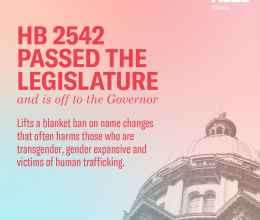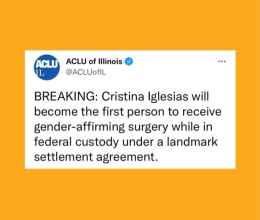By Maya Zimmerman
I am a proud transgender woman born and raised in Illinois. But that does not define me completely. I am also a runner, a knitter, and a musician. I love my wife, my son, and my dog.
Sadly, too many people see me not as that complete person, but only as someone who is transgender. The President disparages transgender soldiers in a series of tweets. Some state legislatures are pursuing oppressive, discriminatory “bathroom” bills. Often there is the daily fear of harassment, just walking down the street with my dog or to go to the store. And the threat of violence to me doesn't begin to compare to the threat of violence faced by trans women of color.
I live with this fear but I work hard to stay true to myself. And it’s important to me that my home state allows me to live a safe, fulfilling life—which includes updating all of my documents to reflect who I am so that I am acknowledged for who I am.
That is why I am thrilled that House Bill 1785 is now law and advances the Illinois Vital Records Act into the 21st t century. Going against the tide of anti-trans activity in other states, Illinois now allows the gender marker on a birth certificate to be changed after consultation with licensed medical professionals—without the mandate of surgery.
Before this law, Illinois—using a standard that was set in 1955—required individuals to undergo surgery in order to change the gender marker on their birth certificate. Now, Illinois law recognizes the great advancements in medical knowledge over the past six decades and updates its requirements to be consistent with today’s standards of care for transgender individuals.
The modern medical community understands that while surgery is sometimes part of a transgender person’s journey, it is not something that everyone is comfortable pursuing or needs as part of their transition. Instead, transgender individuals decide after talking with medical professionals what is the appropriate treatment for them—treatment that is individualized for each person’s particular circumstances.
I have contemplated surgery and discussed this option with my physician. But it’s extremely expensive and the cost has been a roadblock for me. Some individuals cannot undergo surgery at all because of medical reasons, while others simply do not need it. The decision to have surgery or not is one each person should be able to make for themselves, based on their own circumstances with guidance from a doctor. Not having surgery should not be used by the government to deny a person their identity.
Under the old Illinois law, those of us who did not have surgery were left with differing identification documents and at the risk of being “outed”, vulnerable to discrimination, and with our personal safety in danger. This new law helps people like me reconcile our birth certificates with our other important identification documents, like my state-issued ID card.
Over the past two years, I have testified in Springfield in favor of this bill, alongside Illinoisans from across the state who courageously shared their reasons for wanting this new law. I met a transgender woman with hemophilia for whom surgery is simply impossible; I learned from the mother of a transgender student concerned about her son’s process for taking pre-college exams, applying to universities, and securing health care; and I was moved by the mother of a seven-year old transgender girl explaining how a consistent birth certificate would help protect her daughter.
We’ve come a long way since 1955 and I’m very happy our elected officials recognized this problem and did something about it. This small change—with Illinois now becoming the 14th state, along with the District of Columbia and the federal government—dramatically improves my life and the lives of many transgender Illinoisans by ensuring that our documents are consistent. Now I’m proud to say my home state provides transgender citizens with the safety and peace of mind to live their own lives, on their own journey.




